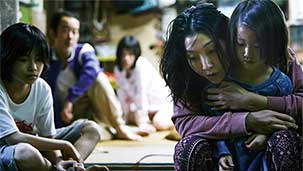Dear Fellow Critics,
No cinematic landscape in 2018 – not the cold majesty of the moon in First Man, or the Afro-tech vistas of Wakanda in Black Panther – was as exotic and unfamiliar to me as the dilapidated house on the outskirts of Tokyo where Hirokazu Kore-eda’s Shoplifters takes place.
When you think of Tokyo, what comes immediately to mind? The crowded skyline, the din of J-Pop music, neon billboards with Kanji characters? Maybe pedestrians crossing the Shibuya intersection like schools of fish? What you probably don’t think of are the places in between those tall buildings, the places on the periphery of all that noise and light. Places like the cramped shack where the makeshift family at the centre of Shoplifters lives. It’s dark, cluttered, with so many drapes and curtains and cushions it seems like an adult-sized version of a kid’s pillow-fort. It certainly bears little relation to the sleek, sparse, symmetrical living spaces we tend to see in stories about the Japanese capital, a city which remains, in the cultural psyche, the closest thing we have to a sci-fi metropolis. This place is far grungier, full of shadows. It should feel claustrophobic, a starter-home for a rookie hoarder, but, instead, contains in its few small rooms an entire universe of deep feeling.
The house is occupied by Hatsue, an elderly grandmother; Osamu, the bumbling, rakish patriarch; Nobuyo, his wife; their son, Shota, and sister, Aki. At least this is what you assume. The truth, we come to learn, is that they are not a family—at least not by blood. Are Osamu and Nobuyo married? Maybe. They sleep together, and play the role of mother and father to young Shota—a boy who, it turns out, Osamu found abandoned in a locked car (that we was robbing) Aki and Nobuyo are not sisters, but they bicker like sisters. And what of Hatsue? She is, indeed, related to someone in the house, but we don’t find out who until late in the film. “Sometimes it’s better to choose your own family,” Nobuyo says, and indeed, this is what the film is all about: what makes a family?
2018 feels like one of those years we’ll look back upon with awe and mourning. There were so many great films. Too many, in fact. Too many movies that, in other years, would have (or should have) been propelled into more theaters by the collective will of laudatory critics. The Sisters Brothers was, by far, the best (and most subversive) western of the last decade, and I’ll never understand how a film that good, with a cast that deep, didn’t build a bigger following. First Man, which should have been the least thrilling movie of the year (we all know how it ends) was instead the most thrilling, and proved that Damien Chazelle can breathe easily outside the atmosphere of the musical. If Boy Erased had been released a few years ago, I’m certain it would have been an Oscar-contender—it’s an easy watch about a hard subject (and I mean that as a compliment); while everyone is chattering about Nicole Kidman’s deadpan performance in the dead-boring Destroyer, it was her performance in Boy that should be winning her accolades.
Even the films that are being celebrated right now seem destined to appear on all those best-of-the-decade lists we’ll be sifting through this coming December. I mean, where does cinema go after Roma? It was a film so good that critics decided to dislike it before it had even landed in the cultural consciousness, just to be ahead of the backlash. The fact is, you can’t claim to love film and dislike Roma. No movie has ever been so much of a movie. It is a pure distillation of cinema.
And then there was The Favourite, which was the year’s most unexpected pleasure. A razor-sharp, laugh-out-loud, genre-bending political parody disguised as a period piece and shot like a skateboarding video. If Roma is the purebred – an embodiment of everything the form is capable of – then The Favourite is the mutant hybrid, assembled from disparate pieces that somehow, impossibly, fit together perfectly.
Any of these films could have been my favourite film of the year (and, at various points, were). But, in my mind, Shoplifters stands apart from them; perhaps for its unobtrusiveness, its quietness. Unlike Roma, it’s a film that doesn’t seem to know that it’s a film; it takes its time, it indulges in the small moments that, in other stories, would be superfluous; nothing seems to be happening, and then, suddenly, two-thirds of the way through, everything happens, and you come to realize how much momentum the plot has been building. The beats of the story, until then, are practically invisible, and this sleight-of-hand trick is only possible because the plot – which involves the adoption/rescue of a young girl from an abusive family, various employment woes and the resulting financial perils, a death and the subsequent disposal of the body – all occur in the background. What matter, to Kore-eda’s camera, isn’t the melodrama of these moments, but what they reveal in his characters; how friendships falls apart when subsistence wages are on the line; how simple the pleasures of being (and having) a father can be.
In a year of masterful long-takes, the lingering shot of Nobuyo’s face, late in the film, stands out; not for the same reason as Cuaron’s epic, majestic tracking shots in Roma, but for the fact that we’ve been following her for the better part of the film, and seem, in that moment, to be seeing her for the very first time; her guard is down, her mask is off, and, by staying on her face, Kore-eda shows us what has been going on beneath the surface for the past two hours; it’s a moment that makes you immediately want to re-watch the film. “Children need their mothers,” someone tells Nobuyo just before that moment. Her answer: “That’s just what mothers imagine.”
In context, that’s a far less nihilistic statement than it seems. And far more heartbreaking. The magic of Shoplifters, what elevates it above all the other cinematic entertainments available to us in this wonderful year, is that it doesn’t aspire to change the way we see the world; it simply offers us a window onto a small part of it that we’ve rarely – if ever – seen before. And in 2018, that feels like a profound accomplishment.
Sincerely,

Jared




